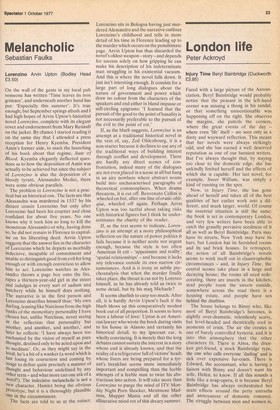Melancholic
Sebastian Faulks
Lorenzino Arvin Upton (Bodley Head 23.50) On the wall of the gents in my local pub someone has written 'Time leaves its iron grimace', and underneath another hand has put: 'Especially this summer'. It's true enough; but September springs afresh and I had high hopes of Arvin Upton's historical novel Lorenzino, complete with its elegant cover and endorsement from Mary Renault on the jacket. By chance I started reading it on the same day that I attended a press reception for Henry Kyemba, President Amin's former aide, to mark the launching of his book about that regime, State of Blood. Kyemba elegantly deflected questions as to how the deposition of Amin was actually to be achieved but since the subject of Lorenzino is also the deposition of a bloody tyrant, Alessandro Medici, there were some obvious parallels.
The problem in Lorenzino is not a practical but an historical one. The facts are that Alessandro was murdered in 1.537 by his distant cousin Lorenzino but only after Lorenzino had been his courtier and close confidant for about five years. No one knows why it took him so long to kill the monstrous Alessandro or why, having done so, he did not remain in Florence to capitalise on his liberating deed. Arvin Upton suggests that the answer lies in the character of Lorenzino which he depicts as morbidly indecisive, incapable of commitment and unable to distinguish good from evil for long enough or with enough conviction to allow him to act. Lorenzino watches as Alessandro throws a page boy onto the fire, rapes a thirteen-year-old girl in the street and indulges in every sort of sadism and butchery while he himself does nothing. The narrative is in the first person and Lerenzino describes himself thus: 'My own darling, leaning like Narcissus from the high banks of the mometitary personality I have chosen but, unlike Narcissus, never seeing in the reflection that personality but another, and another, and another,' and later he reflects: 'I have always been too enchanted by the vision of myself as pure thought, destined only to be acted upon and to meditate'. Or, as they might say in the local, he's a bit of a wanker (a word which is fast losing its coarseness and coming by usage to define quite precisely a manner of thought and behaviour undefined by any Other term — and what more can one ask of a word?). The indecisive melancholic is not a hew character, Hamlet being the obvious Prototype, but it is a thoroughly plausible one in the circumstances.
The facts are told to us at the outset: Lorenzino sits in Bologna having just murdered Alessandro and the narrative outlines Lorenzino's childhood and tells in more detail of his time in Florence leading up to the murder which occurs on the penultimate page. Arvin Upton has thus discarded the novel's oldest weapon— story — and depends for success solely on how gripping he can make his description of his indeterminate man struggling in his existential vacuum. And this is where the novel falls down. It just isn't intersting enough. It consists for a large part of long dialogues about the nature of government and power which draw no colour from the characters of the speakers and end either in bland impasse or self-circling epigrams: 'I learned that the pursuit of the good to the point of banality is not necessarily preferable to the pursuit of the evil to the point of rot,' If, as the blurb suggests, Lorenzino is an attempt at a traditional historical novel in the vein of, say, Zoe Oldenbourg, it is a non-starter because it declines to use any of the traditional ways of building interest through conflict and development. There are hardly any direct scenes of confrontation, indeed many of the dialogues are not evenplaced in a scene at all but hang in an airy nowhere where abstract nouns build into uncharacterised paragraphs of theoretical commonplaces. When drama threatens, it is cut off. Benvenuto Cellini is wheeled on but, after one line oforatio obliqua, wheeled off again. Perhaps Arvin Upton was too tactful about taking risks with historical figures but I think he underestimates the charity of the reader.
If, as the text seems to indicate, Lorenzino is an attempt at a more philosophical reflection on the nature of power politics it fails because it is neither acute nor urgent enough, because the style is too often American lit crit — 'appearance and reality', 'spatial relationships' — and because it lacks any relevance outside its own narrow circumstances. And is it irony or subtle psychoanalysis that when the murder finally takes place, the throat is cut not by Lorenzo himself, as he has already told us twice in some detail, but by his man, Michaele?
It seems churlish to carp too much. After all, it is hardly Arvin Upton's fault if the blurb blows up this comparatively modest book out of all proportion. It seems to have been a labour of love: Upton is an American lawyer who wrote the book during visits to his house in Alassio and certainly his historical detail, to my ignorant ear, is wholly convincing. It is merely that the long debates cannot sustain the interest in a story whose end is already known, and that the reality of a refrigerator full of victims' heads whose livers are being prepared for a tyrant's breakfast seems more immediately important and compelling than the feeble attempts of a feeble man to twist his abstractions into action. It will take more than Lorenzino to purge the mind of ITV Monday Night Porn Shocker, Mentmore Madness, Muppet Mania and all the other alliterative mind-rot of this dreary summer.


































 Previous page
Previous page